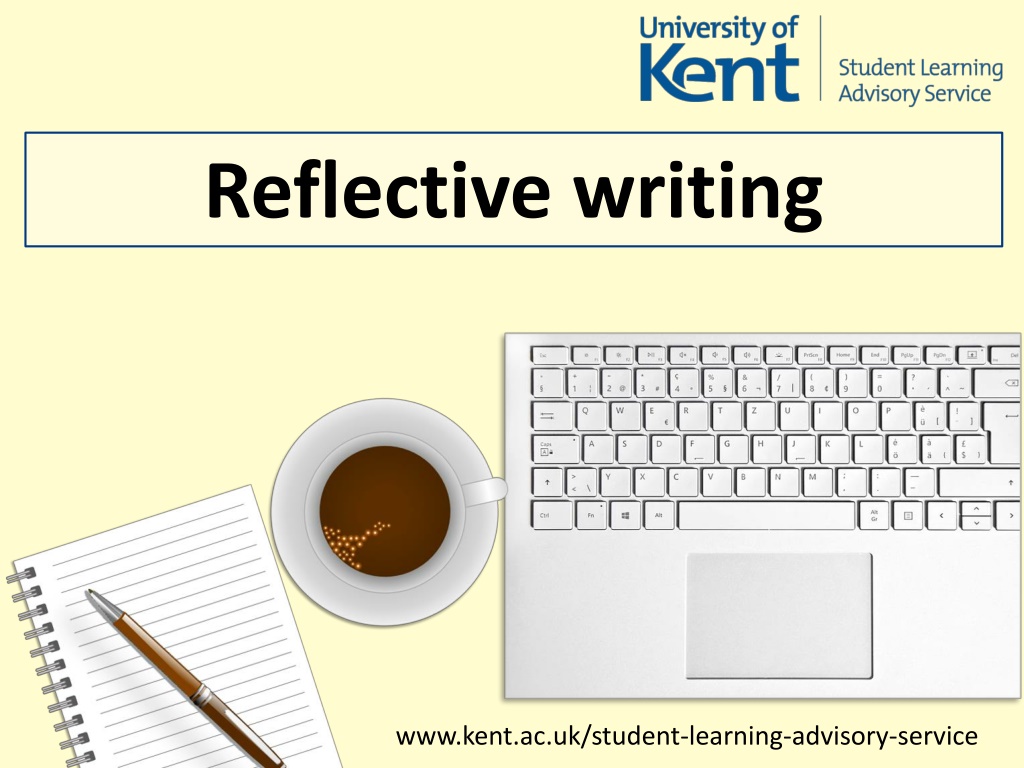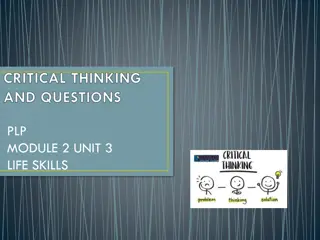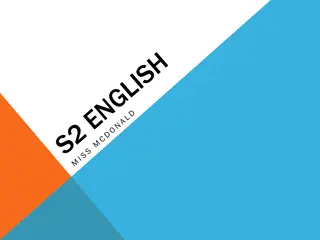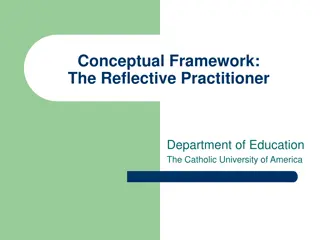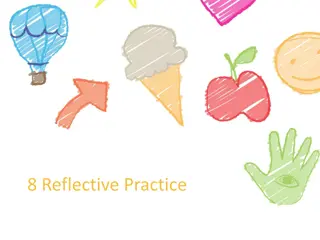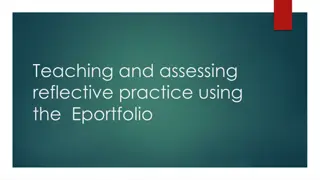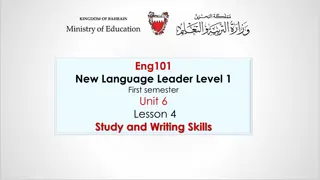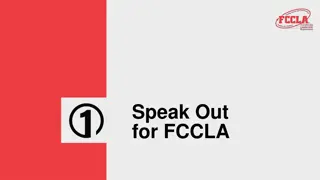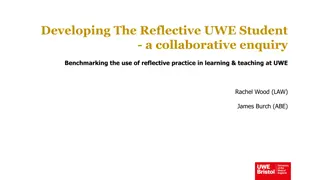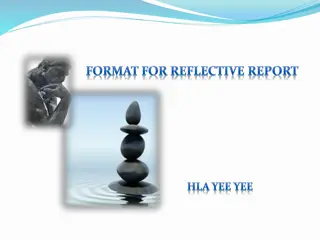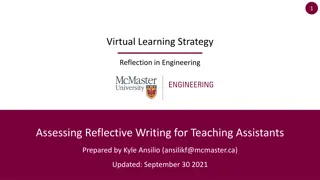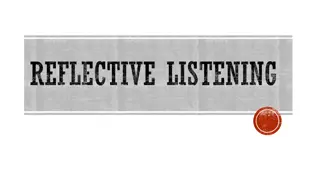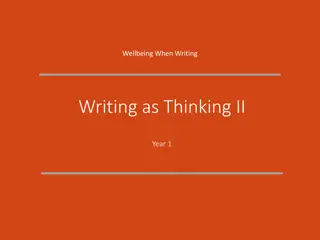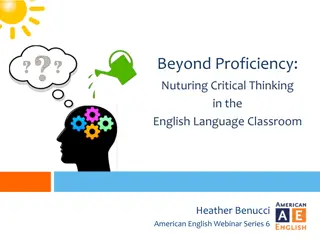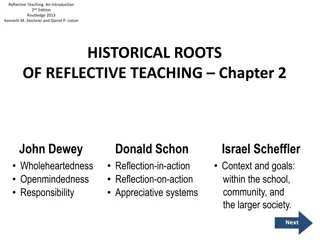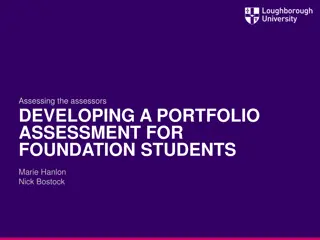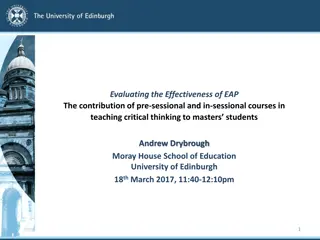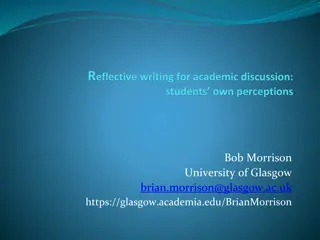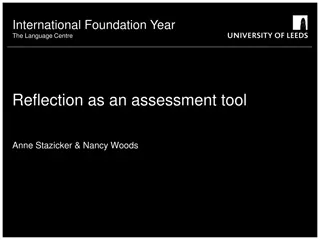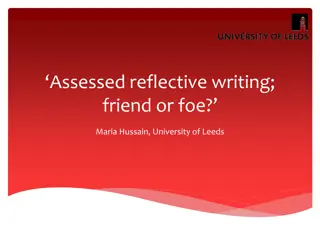Enhancing Critical Thinking Skills through Reflective Writing
Reflective writing formalizes the critical thinking process, enabling individuals to efficiently reflect on experiences, evaluate their actions, and create action plans for improvement. It is an essential skill for personal development and professional growth, often utilized in academic settings to demonstrate students' ability to think critically and apply their knowledge effectively.
Download Presentation

Please find below an Image/Link to download the presentation.
The content on the website is provided AS IS for your information and personal use only. It may not be sold, licensed, or shared on other websites without obtaining consent from the author. Download presentation by click this link. If you encounter any issues during the download, it is possible that the publisher has removed the file from their server.
E N D
Presentation Transcript
Reflective writing www.kent.ac.uk/student-learning-advisory-service
First, reflective First, reflective thinking thinking There are four main stages: 1 The experience: I lit a candle 2 Reflection/observation: Pain! I burnt my finger 3 Analysis/evaluation: Match was too short 4 Action plan/improvement: Buy longer matches Ongoing, everyday, circular process of learning and improvement, but also a vital professional workplace skill
Reflective Reflective writing writing Formalises critical thinking process, enabling you to: - Do it efficiently - Time after time Personal reflective writing - Private diary (reflecting on personal experiences) - Private learning journal (reflecting on academic experiences) Course assignments or learning journals, helping you: - Develop and practise critical reflection skill - Demonstrate your ability to use it
Personal reflective writing Personal reflective writing An easy, informal, self-generated learning aid to help you maximise your performance 1 The experience My seminar today following on from last week s lecture. 2 Reflection/observation I felt out of my depth. I didn t say anything. Some of it I didn t understand. 3 Analysis/evaluation Everyone else brought notes. The same preparation would have helped me. 4 Action plan/improvement I ll spend an hour before my next seminar making a summary of my lecture notes to take with me. I ll also jot down some questions to ask.
Reflective writing assignments Reflective writing assignments Help you develop this important learning tool Show that you can: - Think critically about your own skills and practice - Analyse rather than just describe what happened - Use evidence to illustrate your reflections - Apply what you have learned in order to improve
Tips Tips - - be prepared be prepared If you know reflective writing will be required: Keep a log (journal type entry) to capture your reflections, including: - your thinking behind decisions made - theories you considered or that came to mind - techniques chosen as you work on the project This will provide the honest and accurate raw material for the final reflective element.
Tips Tips - - academic principles apply academic principles apply Follow guidelines provided Answer the question (as it has been put) Organised structure Clear, formal, concise prose Critical thinking (analysis + evaluation) Relevant literature and references One exception: use of the first person permitted: I decided to use Technique A, because
Tips Tips Link experience with theory Link experience with theory Did the experience help you understand the theory? It helped me understand why best practice guidelines suggest that Did the theory prepare you well for the experience? According to theory x, I was expecting the outcome to . But instead Did the experience and the theory match up? The theory didn t allow for the eventuality of In practice Are there conflicts between the two? Sticking to the theory would have harmed
Critical reflection structure Critical reflection structure Introduction (brief scene-setting description of experience/event) Logical, well-structured paragraphs - Focus on successful or challenging aspects of experience/event - Each para focusses on single element, point, or aspect of event - Paras maintain the cycle: experience, reflection, analysis, action plan - Reflections/analyses/proposed actions are discussed with reference to relevant theories, case studies, articles, data and other relevant academic evidence. Conclusion (Summary of main points plus any overall observations)
The reflective writing process The reflective writing process A brief recap: 1 The experience - Briefly, what happened, where and when, who was involved? 2 Reflection/observation - Was it successful - what went well/not so well? What methods did you use? 3 Analysis/evaluation - Why did it work out like it did? How could you have done things differently? 4 Action plan/improvement - Based on this insight, what would you do to improve the outcome if a similar situation arose in future?
Further resources Further resources For guidance on the broader range of skills needed to complete a reflective writing assignment - from writing introductions to editing and proof-reading your work - please go to the SLAS webpages http://www.kent.ac.uk/student-learning-advisory-service where you can: Book a one-to-one appointment with a SLAS adviser Attend a range of Online Bitesize Skills Development sessions
Get in touch Get in touch SLAS CONNECT To book an appointment: www.kent.ac.uk/student-learning-advisory-service learning@kent.ac.uk SLASkent KentUniSLAS SLASkent
